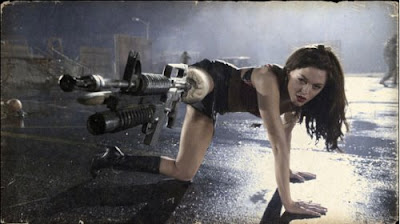Wednesday 28 May 2008
I Live Here
I've returned to my lit-fic masterpiece (at least it is in my fantasy-fuelled head) and I've been fiddling with exposition. Here are my observations:
v1) No exposition: When I removed all detail from the scene and concentrated only on action and reaction, the scene became very disjointed and difficult to follow.
v2) Expected, bare-bones exposition: So I hurriedly rewrote the scene adding first-level consciousness details (that's to say, I wrote without any great consideration, allowing the descriptions to flow effortlessly and cliché-ily from my head). It made sense and flowed nicely and moved at a decent pace.
v3) Unexpected, bare-bones exposition: This is where I am now. With all the actions and reactions in place and the structure suspended at the desired pace, I was able to reconsider all the non-essential stuff (the details and descriptions) and fiddle with them. It was reasonably simple (and highly enjoyable) sifting through the layers of consciousness into those dark waters below and retrieve curious and unexpected and specific observations which give a scene a unique mood and create an acute sense of character.
But the most important observation I have made can be summed up by Sunset Bickham's remark:
'Write in the present for that is where the reader is.'
Sounds peculiar?
If we flow through real-time, we are naturally invited to have our protag open a door and step through the doorway into the hallway and close the door and turn and walk along the hallway ...
It can be a lot of description!
However, the very omission of such transitional material imbued my v1 scene with that zoetropic, strobing effect (the very technique I use when writing those adrenalin-drenched fight or flight scenes).
Bit of a dilemma then?
Robert Rodriguez did something very odd with his movie Planet Terror. With characters spread all over, each under threat, he stopped the movie and flashed up the words 'Missing reel', and then skipped straight to a scene in which all the characters had congregated together in a burning building.
This kept the pace roaring along, but it also upset me and it was some time before I was able to reimmerse myself into the movie, and even then my displeasure gnawed away in silent distaste.
The chapter I am writing replaces three transitory chapters in which I was originally concerned with exposition (probing into my protag's psyche, cross-referencing this with his past, and foreshadowing several dramatic events). Furthermore, this new chapter tackles two exciting events which I had initially planned to save for later (which was a foolish decision as it suggests that I couldn't think of enough exciting events to fill a novel). It is also a reasonably short chapter (a little under 2000 words).
One thing I have learned is that we do not need to stop the action in order to deliver information. If we are cunning, we can characterise and foreshadow - we can do all that expositional stuff - all without pausing for breath; we can weave any piece of information into any momentum-fired nugget of narrative. (Yes, with practise my confidence in this extremist belief is growing.)
But now I am faced with the potentially immersion-damaging effects of providing too little information. Bonding the reader to the protagonist in real-time is an extremely powerful tool for creating and sustaining immersion (suspension of disbelief).
Many more thoughts to come.
Wednesday 14 May 2008
Limited Assumptions
I've had the privilege of reading through ricardo's latest chapter and, once again, the boy has succeeded in raising interesting literary predicaments and enigmas.
Here's a pov issue that has caused me to launch a full-scale investigation (I looked on wikipedia and had a little think on the bus):
Without breaching copyright or jeapordizing ricardo's trust, I can demonstrate the issue with a single line:
There was no way out.
In a chapter written in third-person limited, my reaction to this line (and a couple of successive lines) was to leave pov (entering an omniscient third-person).
Why?
Well it's a question of knowledge.
Mister Omniscient knows all! But Mister Limited's greatest asset is his ability to bond the reader to any given character, sharing that character's emotions and perspective.
As such, some bit of my brain presumably went 'Hold up: How can this character be sure that there is no way out?'
Ricardo and I discussed this a little and I can see his thinking:
The pov remains limited to the protagonist because it adheres to his personal perspective - his assumptions. Protag assumes that there is no way out. Protag knows that he assumes there is no way out.
I'd be interested in any examples of pros using this limited assumption technique. On many occasions I have read something along the lines of 'He could see no way out.'
Regardless, ricardo and I concurred that this sentence was a 'tell' and the information could have been imparted in a better manner. The one blot on a flawless piece of work, and a fascinating discussion point.
Tuesday 13 May 2008
The Rickety Bridge
One example I often use when discussing shows and tells is that of the rickety bridge.
'She stepped onto the rickety bridge' is a tell. Soulless.
How does she know that the bridge is rickety?
Well, see for yourself what constitutes a rickety bridge; see how much material is available for the shows.
And don't look down!
Thursday 1 May 2008
Do What Thou Wilt
On the bus this morning, I overheard my colleagues discussing their evening. One of them went bowling, bought a hot-dog, and hung out at his alcoholic cousin's flat.
The other did the same, although he didn't buy a hot-dog.
At work, E was talking about the hand-job he got from a prostitute last night, and K stole a convertible in order to escape Jamaican gangsters.
Yep, GTA4 is here.
Hopefully these people will buy a copy to keep them off the streets!
Recently, I was discussing Second Life with a friend. Second Life is just that: it's a virtual world filled with avatars. Sounds great! You can live out your wildest dreams and fantasies in the relative safety of a virtual environment.
So what was the first thing my friend did when he was born into this new world?
He followed his mates into the sewer.
When I became too weak to laugh any more, he continued.
Down the sewer, he encountered a band of 'residents' who had made themselves artistic groinal attachments, and who drove customised, phallus-shaped cars.
I have no point to make other than the obvious: People are f*ckin' weird and pay good money to feed their fantasies.
Righty, I'm off to buy Do What Thou Wilt: A Life of Aleister Crowley from Amazon. Apparently, he was 'an occult leader, heroin addict, sexual adventurer, misogynist, and visionary.' All in the name of research. Me, not him.
Subscribe to:
Posts (Atom)








